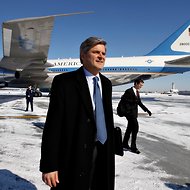Yet when it came to his considerable personal wealth, Mr. Romney never really left Bain.
In what would be the final deal of his private equity career, he negotiated a retirement agreement with his former partners that has paid him a share of Bain’s profits ever since, bringing the Romney family millions of dollars in income each year and bolstering the fortune that has helped finance Mr. Romney’s political aspirations.
The arrangement allowed Mr. Romney to pursue his career in public life while enjoying much of the financial upside of being a Bain partner as the company grew into a global investing behemoth.
In the process, Bain continued to buy and restructure companies, potentially leaving Mr. Romney exposed to further criticism that he has grown wealthier over the last decade partly as a result of layoffs. Moreover, much of his income from the arrangement has probably qualified for a lower tax rate than ordinary income under a tax provision favorable to hedge fund and private equity managers, which has become a point of contention in the battle over economic inequality.
An examination of Mr. Romney’s public financial disclosures, as well as interviews with former Bain partners, business associates and counselors to his campaign, reveals the extent of his financial relationship with Bain Capital and how it has allowed him to continue amassing a personal fortune while building a political career.
Though Mr. Romney left Bain in early 1999, he received a share of the corporate buyout and investment profits enjoyed by partners from all Bain deals through February 2009: four global buyout funds and 18 other funds, more than twice as many over all as Mr. Romney had a share of the year he left. He was also given the right to invest his own money alongside his former partners. Because some of the funds and deals covered by Mr. Romney’s agreement will not fully wind down for several years, Mr. Romney is still entitled to a share of some of Bain’s profits.
During his political career, Mr. Romney has promoted his experience as a businessman while deflecting criticism of layoffs caused by private equity deals by noting that he left Bain in 1999. But records and interviews show that in the years since, he has benefited from at least a few Bain deals that resulted in upheaval for companies, workers and communities.
One lucrative deal for Bain involved KB Toys, a company based in Pittsfield, Mass., which one of the firm’s partnerships bought in 2000. Three years later, when Mr. Romney was the governor of Massachusetts, the company began closing stores and laying off thousands of employees. More recently, Bain helped lead the private equity purchase of Clear Channel Communications, the nation’s largest radio station operator, which resulted in the loss of 2,500 jobs.
Much information about Mr. Romney’s wealth is not known publicly. Federal law does not obligate him to disclose the precise details of his investments. He has declined to release his tax returns, and his campaign last week refused to say what tax rate he paid on his Bain earnings.
But since Mr. Romney’s payouts from Bain have come partly from the firm’s share of profits on its customers’ investments, that income probably qualifies for the 15 percent tax rate reserved for capital gains, rather than the 35 percent that wealthy taxpayers pay on ordinary income. The Internal Revenue Service allows investment managers to pay the lower rate on the share of profits, known in the industry as “carried interest,” that they receive for running funds for investors.
“These are options that are not available to the ordinary taxpayer,” said Victor Fleischer, a law professor at the University of Colorado who studies financial firms. “You continue to take your carried interest — a return on labor, not capital invested — and you’re paying 15 percent on it instead of high marginal income rates.”
Peter Lattman and Kitty Bennett contributed reporting.
Article source: http://feeds.nytimes.com/click.phdo?i=c45cc58c4585130169d948b2233658da
